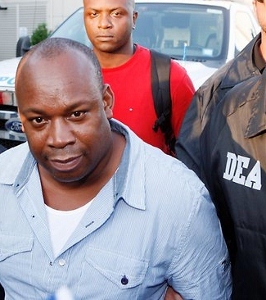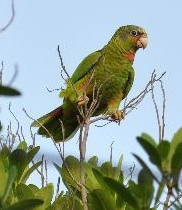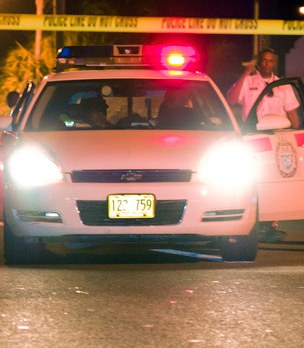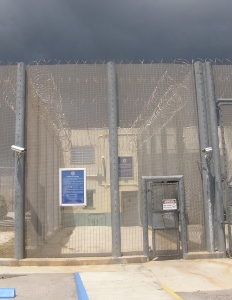Archive for March, 2012

Misick seeking political asylum in wake of warrant
 (CNS): Following the news from the Turks and Caicos Monday, that officials there have issued a warrant for the arrest of the former premier, Michael Misick says he is being forced to seek political asylum in a third country. In a statement to the press released yesterday evening the former TCI premier who is wanted for questioning regarding a corruption investigation said he could not expect to get a fair hearing in his native country. He said he was being politically persecuted because of his plan to move the country towards Independence. Misick also accused the UK interim government of changing laws in an attempt to convict him and his political colleagues and supporters.
(CNS): Following the news from the Turks and Caicos Monday, that officials there have issued a warrant for the arrest of the former premier, Michael Misick says he is being forced to seek political asylum in a third country. In a statement to the press released yesterday evening the former TCI premier who is wanted for questioning regarding a corruption investigation said he could not expect to get a fair hearing in his native country. He said he was being politically persecuted because of his plan to move the country towards Independence. Misick also accused the UK interim government of changing laws in an attempt to convict him and his political colleagues and supporters.
The former leader of the overseas territory did not reveal his whereabouts or the country in which he will be seeking asylum but it is understood that since his exile from TCI he has been living in the Dominican Republic.
Misick described the investigation as a “set-up for a modern-day John Crow political lynching,” and said he would not be a part of it. “I have therefore sought protection from anothercountry in accordance with the United Nations Convention on Human Rights and the human rights laws of that country, as it is my right to do and the right of any person that is being politically persecuted,” he stated. “I am not a fugitive, and will never be a fugitive. I have applied for political asylum from another country and I am merely seeking protection from political persecution.”
Misick said however that he would continue to bring challenges to clear his name and that of the administration he led. “I dream to return to my homeland as an independent, victorious, proud and free nation,” he added.
Accusing the current TCI government of already convicting him he said the whole notion of a trial was just a show as he made it clear he would not be returning to face the special prosecution investigation team.
He accused Helen Garlick, the special prosecutor appointed by the UK government, of trying to get rich of the backs of Turks and Caicos Islands’ tax payers and to make a name for herself. He said she had already collected over $20 million slated to collect at least another $10 million while the interim government is laying off hundreds of civil servants, cutting pensions and increasing taxes.
Misick said he faced “political persecution of the highest order” because he and his supporters “desire to live in an independent Turks and Caicos Islands.”
On Monday officials in TCI confirmed that not only had a warrant been issued for Misick’s arrest but Interpol had also issued a red notice. The governor’s office said the prosecution team had tried to get Misick to come back voluntarily to answer the allegations of corruption and money laundering but despite every opportunity being given to he has failed to show up.

US authorities may accept lower sentence on Dudas
 (Jamaican Gleaner): United States prosecutors have indicated a willingness to accept a lower minimum prison sentence for alleged drug kingpin Christopher 'Dudus' Coke, even as they prepare to return to the US District Court in New York for his May 22 sentencing hearing. Prosecutors now say they are willing to accept an 18-year prison sentence for the Jamaican, down from the 23 years they still think he deserves. Last Friday a judge delayed the sentencing of Coke and ordered the prosecutors to provide proof of their allegations about his violent control of a drugs gang to back their demands for a lengthy prison term. But, according to the prosecutors, even if the allegations about Coke's murderous control of an international criminal gang are not proven, an 18-year prison sentence is deserved.
(Jamaican Gleaner): United States prosecutors have indicated a willingness to accept a lower minimum prison sentence for alleged drug kingpin Christopher 'Dudus' Coke, even as they prepare to return to the US District Court in New York for his May 22 sentencing hearing. Prosecutors now say they are willing to accept an 18-year prison sentence for the Jamaican, down from the 23 years they still think he deserves. Last Friday a judge delayed the sentencing of Coke and ordered the prosecutors to provide proof of their allegations about his violent control of a drugs gang to back their demands for a lengthy prison term. But, according to the prosecutors, even if the allegations about Coke's murderous control of an international criminal gang are not proven, an 18-year prison sentence is deserved.
"The undisputed facts before this Court make (it) clear that the appropriate sentence, and one sufficient but not greater than necessary … is 216 months (18 years)," the prosecutors said in a memorandum filed in court hours before last week's postponed sentencing hearing.

UK charity calls for more cash for OT’s birds
 (CNS): The UK government needs to increase spending tenfold in its overseas territories, including Cayman, to protect significant numbers of birds facing extinction, the Royal Society for the Protection for Birds has warned. Graham Madge, an official from the ornithological charity, told the UK Sunday paper, The Observer, that fascinating and charismatic species of birds on the remote shores of UK overseas territories are now close to extinction. A report which has been submitted to the Foreign Office as part of the consultation process regarding the territories says 33 species of birds, including penguins, parrots and albatrosses, are now critically endangered across the remnants of the British Empire.
(CNS): The UK government needs to increase spending tenfold in its overseas territories, including Cayman, to protect significant numbers of birds facing extinction, the Royal Society for the Protection for Birds has warned. Graham Madge, an official from the ornithological charity, told the UK Sunday paper, The Observer, that fascinating and charismatic species of birds on the remote shores of UK overseas territories are now close to extinction. A report which has been submitted to the Foreign Office as part of the consultation process regarding the territories says 33 species of birds, including penguins, parrots and albatrosses, are now critically endangered across the remnants of the British Empire.
"Our overseas territories hold more threatened bird species than the entire European continent," said Madge. "Yet only £1.4m a year is spent by the government protecting habitats that provide homes for these endangered creatures. We need to spend 10 times that amount to save them."
The key concern for environmental activists is the need to improve care of the alarming number of threatened and endangered animals in the territories. "The overseas territories hold 85% of the threatened biodiversity for which the UK is responsible," said Jonathan Glenn-Hall of the RSPB.
Birds are not the only threatened species; the blue iguana in Cayman and sea turtles across the Caribbean, which will lose many nesting sites as global warming melts ice caps and causes sea levels to rise, are also at risk.
It is the importance of the bird populations of the overseas territories that is stressed by Madge, however, and in particular seabirds. When it comes to these, Britain is in second place among countries with the most threatened populations. Apart from feral invaders, ecologists have highlighted three other main dangers facing birds in overseas territories: climate change, poor planning controls and weak management of local fisheries.
In the Cayman Islands, the RSPB said uncontrolled development is destroying the habitats in which the Grand Cayman parrot and the Cayman Brac parrot breed, again with disastrous consequences for populations. "Many of these places rely on money brought by tourists who visit to see the exotic wildlife," added Madge. "We have a responsibility to make sure that wildlife survives."

Top cop says officers are getting overseas experience
 (CNS): The police commissioner has said that several officers from the RCIPS have already been sent on attachment and training courses overseas where they have gained new crime fighting experiences. He said several officers have gone to major cities in the UK to work with serious crime units there and more will be going in the coming weeks. He also said others have been sent on training programmes with the FBI in the United States. Baines said the local police force was constrained by its budget when it came to sending staff abroad for training but he said the RCIPS still seized every possible opportunity for officers to gain experience in other jurisdictions.
(CNS): The police commissioner has said that several officers from the RCIPS have already been sent on attachment and training courses overseas where they have gained new crime fighting experiences. He said several officers have gone to major cities in the UK to work with serious crime units there and more will be going in the coming weeks. He also said others have been sent on training programmes with the FBI in the United States. Baines said the local police force was constrained by its budget when it came to sending staff abroad for training but he said the RCIPS still seized every possible opportunity for officers to gain experience in other jurisdictions.
David Baines spoke about the various training his officers were undergoing while answering questions in finance committee last week. As members voted for an additional $2million opposition member Anthony Eden asked if officers were being sent abroad to address what people believe are failings in investigative capabilities.
The commissioner also revealed that he was in the process of recruiting 54 officers and that soon the staffing levels on all shifts would be at their full compliment. He said 40 people had been identified but in some cases these officers had to work out long notice periods in the UK before they could start work here. He said officers were being recruited mostly from Britain, Canada and Jamaica.
Baines also noted that as staffing levels improved which would mean he would not have to ‘rob’ one police for another in the wake of a serious incident, he said this would also lead to rebuilding community policing and the possible return of ‘live-in’ police officers with their families in the district stations at North Side and East End.
Asked about staff changes he said around 10% of the staff were being moved around to get a better mix of experienced officers with new recruits and help develop younger officers. Baines said that he was aware that change was not always welcome but his goal was to prevent the police from working in silos. The changes he said had been carefully planned and also reflected the promotion of several officers.
He also denied speculation that ex-pat officers were being given favourable conditions and working the 9-5 shifts. He said all staff were mixed up and were working across the five different shifts. The commissioner said it may be what people perceive but it was not the reality as there was no discrimination in the service.

Krys Global win Big
(CRFU): The Krys Global Buccaneers retained the DART knockout Vase on 3 March witha 24-0 drubbing of the Queensgate Pigs Trotters.The Pigs Trotters, coming off a resounding victory over the DHL Storm could not get out first gear throughout the game as a mixture of big game nerves and the absence of talisman Marco du Plessis handed control to the Buccaneers. Whilst against the Storm the Pigs Trotters were able to turn over ruck ball and steal ball in the lineout the Buccaneers were able to stifle the Pigs around the pitch and a frustrated Pigs Trotters pack found no joy on the day.
The Buccaneers, who in last year’s knockout final defeated the John Doak Architecture Iguanas were elated with their first trophy of the season but the league trophy has eluded the team since 2009 when they won the double.
Next season will provide the Buccaneers a renewed chance at the Triple when they will have a chance to compete for the Heineken Charity Shield, the Alex Alexander Memorial Trophy and DART Knockout Vase.

Crime concerns top OT report
 (CNS): The result of the UK’s consultation with its overseas territories has revealed that crime and the need for economic diversification remain the leading concerns among the people. Following the open public consultation by the FCO inviting comment from the territories, the report reveals that people from the Cayman Islands submitted the most responses of any territory, making up 35% of the submissions. The report stated that the growth in crime rates was discussed more frequently than any other issue and over half of the concerns regarding crime were raised by contributors from the Cayman Islands.
(CNS): The result of the UK’s consultation with its overseas territories has revealed that crime and the need for economic diversification remain the leading concerns among the people. Following the open public consultation by the FCO inviting comment from the territories, the report reveals that people from the Cayman Islands submitted the most responses of any territory, making up 35% of the submissions. The report stated that the growth in crime rates was discussed more frequently than any other issue and over half of the concerns regarding crime were raised by contributors from the Cayman Islands.
In the Cayman government’s own submission it too highlighted public safety as a significant challenge. The report said it was violent and organized gang crime which was raised most often.
The report will be one of a number of elements that will contribute towards shaping a new white paper that the UK is preparing in regards to its future relationships with its territories. Consequently, people were asked to comment on how the UK could support and cooperate with the territories in addressing the various challenges that residents perceive are impacting their lives.
Law enforcement was considered the most important area of cooperation and most of these submissions came from residents of the Cayman Islands, one of whom said the “skills related to the gathering and effective protection of solid evidence is lacking.”
Another submission received from the Cayman Islands suggested that the UK Government was not meeting its obligations to tackle drug smuggling or training police and called for a greater focus on training local police as opposed to relocating them from other countries.
Aside from crime, Cayman, like other territories, raised economic challenges but the report notes that the submissions from Cayman and elsewhere were as much about structural economic issues as they were about the economic crisis. The need for diversification of the economy and unemployment were specific concerns raised in the report. One of the most frequent concerns was the fear that ex-patriot workers were undercutting the pay of local workers.
“A total of eight submissions, largely from residents of the Cayman Islands, mentioned this concern and two respondents from the Cayman Islands proposed the introduction of a minimum wage to combat the problem.”
The report also published the official response from the Cayman government on this issue: “Striking the appropriate balance between attracting qualified and expert labour from overseas and, in the process of so doing, not obstructing the progress and development of the local workforce remains an elusive task and one that would seem to be central to any successful economic planning in the Cayman Islands.”
In summarizing the findings of the consultation exercise, the report found that the greatest challenges to economic development include economic diversification, infrastructure needs and the global financial crisis but when it came to everyday life, the territories are most challenged by crime, cost of living and unemployment. When it came to cooperation with the UK, law enforcement was the most significant.
Corruption and election franchising were also cited as difficult for territories when dealing with politics and government. The issues of transparency, poor planning and corruption were the most prominent issues raised in relation to good governance and highlighted as priorities for improvement. The UK could help more, the report found, with the provision of audits and advice.
See full report below.

Educators invited to apply for annual DMS grant
(CNS): Organisers of educational initiatives are being invited to apply for these years Joanna Clarke Excellence in Education Award (JCA), and the Joanna Clarke Scholarship Fund. Any individuals or not for profit groups that have a worthwhile positive education programme that needs support can submit an application from now until 1 April 1st. Sponsored by DMS recipients can receive up to $12,000 KYD for a programme or $5,000 KYD for a scholarship. Now in its sixth year, Don Seymour, president of DMS said giving back to the local community through was fundamental to its business practice.
Applications are being circulated throughout local schools and not for profit organizations and are available at the award website www.joannaclarkeaward.ky. Parties eligible for consideration include but are not limited to teachers, students, Parent Teacher Associations (PTAs), not for profit organizations, government departments and schools.
The JCA Committee will carefully review all applications submitted, and if several worthy projects are identified, they may provide grants to multiple organizations up to $12,000 KYD in total.
“It is of paramount importance to us to visit the recipients and follow up with the progress of the initiatives – my favourite part of this whole process is interacting with the children and learning how they are benefitting,” said Joanna Clarke. “After all, it is about the children. We are always greeted with such a warm reception, and to date it has been indescribably rewarding to see how well maintained the initiatives we have selected are.”
The JCA committee introduced the Scholarship Fund two years ago and is once again seeking applications from an aspiring or existing educator looking to further his/her education or wishing to further expand on his/her professional development. Up to $5,000 KYD will be awarded to the successful recipient.
For further information and to obtain an application contact Tara Tvedt-Pearson, dms Organization Ltd. at 749-2407 or ttvedt@dms.com.ky

Drugs rule in local jail
 (CNS): The use of ganja by inmates at HMP Northward is so pervasive it rules the day to day goings on throughout the jail, according to a recently released inmate. Speaking to CNS, the former prisoner, who was serving a sentence for a non-violent, non-drug related offence, said that ganja was used openly while he was there, with officers turning a blind eye to its consumption. The ex-inmate told CNS that the older prisoners controlling the trade inside the jail use juvenile inmates to collect and run the drugs. He also revealed that prisoners are making a potent homebrew out of their breakfast juice and stolen yeast. Prison officials, however, refute the idea that drugs are tolerated in the prison.
(CNS): The use of ganja by inmates at HMP Northward is so pervasive it rules the day to day goings on throughout the jail, according to a recently released inmate. Speaking to CNS, the former prisoner, who was serving a sentence for a non-violent, non-drug related offence, said that ganja was used openly while he was there, with officers turning a blind eye to its consumption. The ex-inmate told CNS that the older prisoners controlling the trade inside the jail use juvenile inmates to collect and run the drugs. He also revealed that prisoners are making a potent homebrew out of their breakfast juice and stolen yeast. Prison officials, however, refute the idea that drugs are tolerated in the prison.
Eric Bush, Chief Officer in the Portfolio of Internal and External Affairs, which has responsibility for the local prison system, said contraband, including drugs, alcohol, weapons and cell phones, are not uncommon in prisons around the world.
"Whilst we would all like to have absolutely sterile prisons, this is not the reality that we live in,' he said. "That said, there is no tolerance for contraband found within Cayman's prisons."
The former prisoner, who has asked CNS to protect his identity, said he wanted to relate his experiences because he believes it is important that the Cayman public understands the extent of the problems inside HMP Northward with drug and alcohol misuse. Mostof the drugs get inside over the prison fence, which the prison admits is now an almost daily offence, and the former inmate explained what happens.
“Cell phones play a big part in co-ordinating this feat for it is important for the 'collector' to reach the drugs before security catches them on the cameras,” he told CNS. Once the ganja is thrown over, he explained, those controlling the drugs business dispatch their ‘’foot soldiers" to collect the drugs and run with it into the block, where it is immediately handed over to another inmate to avoid a search. “In most cases these individuals are juveniles because they cannot be penalized and they are also impressionable,” the ex-inmate said, adding that the youngsters were paid for their efforts in ganja.
"Once inside the block the 'bosses' break apart the ganja and divide it into pill bottles obtained from the prison clinic. These bottles are then sent to other blocks for $100 a bottle. The lower level dealer then breaks it up again into $5 portions for sale. Inmates pay the $5 in the form of phone cards or packs of cigarettes.”
Eric Bush said individuals are serving prison sentences after being caught and found guilty of throwing drugs over the prison fence. “Officers in the prison are on constant watch,” he said. “They work relentlessly to prevent such contraband from entering and do all they can to detect what has been thrown over the chain-link fence or brought in illegally.”
Since June last year, he said, there have been 32 incidents of drugs recovered from prisoners and some 41 incidents of drugs found within the secure areas, which illustrates the pervasive nature of the problem.
The former inmate, who was serving his first ever sentence, agreed that the drugs were prevalent and used by a significant number of inmates but he described that use as flagrant. “The biggest shock for me at Northward was the blatant use of ganja in everyday life … Just walking into Bravo Wing, there is a pungent odour of weed.”
He revealed that most inmates smoke the drug in their cells but others sit in the main dining hall near the window and smoke while watching TV. “However, the real heavy smoking occurs at 9:30pm lock down, when the inmates know that the on duty guards cannot enter the cells past 9:30pm unless ordered by the director,” he said. “Between 9 to 9:30pm there is a mad dash by most of the inmates to purchase weed and rolling papers.”
The inmate claimed that a guard would bring him 2 to 3 packs of papers each week so he could swap them individually for snacks and cigarettes. “Each pack holds 32 individual sheets, which means 94 joints were consumed in a week just from the papers I sold,” he said.
Evening exercise is another popular time for prisoners to smoke as there is an unwritten rule between the inmates and the guards that this is their time to smoke weed, he claimed. “The officers sit and supervise the exercise field far away from the 50 or 60 inmates,” he said, adding that it was common to see guards ignoring those using the drug.
According to the ex-prisoner, the extent of the drug problem in jail drives prisoners to steal in order to pay for their weed and the most common form of stealing is food from kitchen. Inside Northward food is almost as valuable as the drugs, he said, and inmates working in the kitchen can steal and sell food to dealers to support their habit. “The dealers eat like kings at Northward and this encourages the drug trade,” he said.
Illustrating the prevalence of drug use, he explained that F-Wing, which is the enhanced wing with special privileges, was half full.
“It is the only place within Northward that if you fail a drug test you will get sent back to general population,” the ex-inmate stated. “Ironically, it is the only block that is currently halffull. It can house over 42 inmates but when I left it had only 21 inmates. This is in a prison that is dangerously over populated. Inmates tell me that they enjoy their ganja way too much to move over to F-Wing. That is to say, weed rules the minds and attitudes of most of inmates.”
However, officials denied that officers are complacent and lax, noting that there are consequences and inmates can get 28 days loss of remission when drugs are found on them. Bush said searches are carried out on a daily basis, both in cell blocks and around the prison estate.
Over the last month alone, he said, 121 searches were conducted, which resulted in the recovery of cell phones, cell phone chargers, ganja and shanks (home-made weapons). Furthermore, since the start of the year 36 prisoners have been charged after testing positive for ganja or for having ganja in their possession. Officers carry out targeted and random drug testing continuously on prisoners, and from June 2011 to present a total of 240 male prisoners were tested. Of those, 61 tested positive for ganja and no one tested positive for cocaine, Bush added.
While ganja appears to be the drug of choice in Northward, inmates are also adept at brewing homemade alcohol, the formerprisoner said.
“The inmates make a potent brew called 'lingo'. I have seen inmates totally hammered on this stuff on a weekly basis. Each morning at breakfast the usual suspects fill large jugs with any kind of citrus juice — orange or pineapple. They then either steal or purchase from kitchen workers the sugar or yeast for fermentation. Yeast is harder because the prison locks it up in a freezer.”
Once the prisoners have these basic ingredients, they store the juice mixed with the sugar and yeast under the prison bunks for about 5 to 8 days, he said.
“The pressure builds up so the inmate has to constantly loosen the cap so it doesn't explode,” the inmate said. “This has happened before and it sounds like a gun went off. Most prisoners who brew the sour tasting, wine-like-alcohol then sell it by the glass for weed or a $5 phone-card. When caught with "lingo" officers simply warn the inmates and dump out the homemade hooch.
“I have seen officers laugh at inmates who are drunk and foolish, simply telling them to sleep it off,” he added, despite the fact that many prisoners are in Northward because of substance abuse problems.
Real bottles of rum are smuggled inside the jail to the blocks of the inmates who work the store room, he said. “When the items from the store room, such as inmates' canteen, soap, food for the kitchen or new prison uniforms, are delivered there always seems to be contraband included,” the ex-inmate added as he expressed his concern about the prevalent use of drugs and lingo by the very young prisoners, who, he said, were not only fearless but very angry.
According to Chief Officer Bush, since June last year there have been eight occasions where homemade alcohol (which, he said, is also made from fruits and bread soaked into water) was confiscated and the prisoners received four days loss of remission.
He also pointed out that staff at Northward work in an enclosed and often isolated environment with men deprived of their liberty. “Some of the prisoners are dangerous, aggressive, mentally disturbed and suffer from addiction,” the chief officer said, as he pointed to the assault on Friday in which an inmate bit off a piece of a prison officer’s ear.
“I would like to commend the men and women in the Prison Service for their honourable and dedicated service to the people of the Cayman Islands and encourage them to keep their heads high and continue to serve their country well,” Bush added.

Travellers face possible delays at Cayman airport
(CNS): Modifications to security at Owen Roberts International Airport may result in delays over the next few weeks, officials have stated. The Department of Immigration said the public may experience some minor delays in the arrival hall of the airport in Grand Cayman as a result of a reduction in space in the immigration arrival hall. In an effort to alleviate the congestion, the Cayman Islands Airports Authority (CIAA) is assisting immigration officials during peak periods to ensure the smooth processing of arriving passengers.
“Every effort is being made to minimize disruption to our services inclusive of minimizing inconvenience to arriving passengers,” Acting Chief Immigration Officer Bruce Smith said. “We understand the need for the CIAA to make these modifications to the terminal layout in the interest of passenger safety and security. We seek the public’s understanding as the Cayman Islands moves to enhance its service and strives to provide a welcoming atmosphere to returning residents and visitors,” he added as he offered apologies for the inconvenience.
Officials said that future updates will be disseminated on the progress of the renovations.

Robbers strike in capital
 (CNS): Detectives from George Town police station have opened two investigations following an attempted robbery and a robbery which occurred within less than an hour of each other on Sunday night. In the first instance the would-be robber escaped empty handed but in the second the two suspects got away with cash. In both cases police say that the perpetrators were armed with hand guns. The attempted robbery occurred at about 9.20pm last night when a female taxi driver arrived in Breezy Way, George Town, to pick up a fare. As she arrived at the location, a man appeared from the bushes and pointed a handgun at the window of the taxi. The woman drove off and the man did not obtain any cash.
(CNS): Detectives from George Town police station have opened two investigations following an attempted robbery and a robbery which occurred within less than an hour of each other on Sunday night. In the first instance the would-be robber escaped empty handed but in the second the two suspects got away with cash. In both cases police say that the perpetrators were armed with hand guns. The attempted robbery occurred at about 9.20pm last night when a female taxi driver arrived in Breezy Way, George Town, to pick up a fare. As she arrived at the location, a man appeared from the bushes and pointed a handgun at the window of the taxi. The woman drove off and the man did not obtain any cash.
Police said this first suspect is described as having a brown complexion and about 5’7” in height. He was of small build with a broad upper body and was wearing blue denim cut-off pants, a dark long sleeve shirt and a navy blue and white bandana. He also had a dark tam covering his head and face.
Around 50 minutes later, at about 10.00pm, two masked men entered the office of Cayman Karting in Sparky Drive, George Town, where staff were closing up for the night. One of the suspects was in possession of a handgun. The suspects demanded money before running off from the scene with a sum of cash.
The first of these two suspects is described as having a skinny build, about 5’9” wearing a yellow and black hoody, long dark baggy jeans and a bandana covering the face. He spoke with a Caymanian accent. His accomplice was around 5’11” in height, wearing all black clothing and a bandana covering his face.
No shots were discharged and no-one was injured in either of these incidents.
Anyone who has information about either of these crimes should contact George Town CID on 949-4222, the RCIPS tip-line on 949-7777 or Crime Stoppers 800-8477 (TIPS).